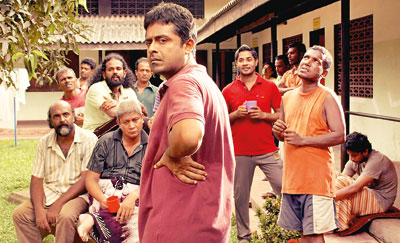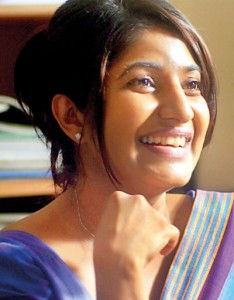A film that works for its humanity not merely its accurate psychiatry

Conflicted: Vishwa ( Shyam Fernando) at the National Institute of Mental Health and left, Samadhi ( Samanalee Fonseka)
Brothers Kalpana and Vindana Ariyawansa, who jointly created and directed this extraordinary film, have called it “Premaya Nam…” which means, “Love is…”. Thus the name of the film promises a definitive insight into the nature of this thing called love. Truth to tell, the film finally gropes towards that goal and therefore delivers what it promises. Even so, the actual stuff of the film, the record of events experienced by the central character, who happens to be a young man suffering from the mental disorder called, “Obsessive Compulsive Disorder” or “OCD”, imposes on it the appearance of a documentary. Particularly is this so, because a Consultant Psychiatrist Dr. Kapila Ranasinghe, has served as technical advisor and the bulk of the film has been shot at our National Institute of Mental Health, giving the viewers a surreal perception of real life.
As it happened, my much-lamented friend Senior Lecturer in Psychology at London University, Dr. Padmal De Silva wrote a book on OCD. From him I learnt that OCD has two elements, an obsessive and compulsive. The obsessive element is an unstoppable recurrent thought and the compulsive element is an irresistible behaviour. In the film, the recurrent thought that plagues the protagonist Vishwa (insightfully played by Shyam Fernando) is a revulsion towards his own urine. The compulsive repetitive behaviour is an imperative felt need to cleanse himself with a full body bath every time he passes urine. Predictably this obsessive thought and repetitive behaviour have a devastating impact on his family, work and social life. All concerned are fellow-sufferers but the worst affected turns out to be his newly-wedded wife Samadhi (empathetically and beautifully played by Samanalee Fonseka). She did have more than an inkling of Vishwa’s problem before marrying him, and she believed that she could help him to overcome his mental disorder. Intellectually Vishwa is smart and part of his attraction for Samadhi was his demonstrated capacity for mathematical computation in his head, faster than Samadhi could manage with her electronic calculator.
Vishwa’s OCD was so unmanageable, however, that Samadhi finally became — not as often happens — divorced or separated, but estranged. She goes back to her parents.
Vishwa is of course, a screaming case of OCD and were he only that he would have been of interest only to specialists in mental disease. But in the film, Vishwa suffers not only from OCD, but also from the pangs of unconsummated conjugal love. That is what endows his plight with human interest. He desperately wants to win back Samadhi and is willing to do whatever it takes to achieve his heart’s desire. He feels an existential need to be reconciled with her. What is takes to be so reconciled, it the story the film unfolds.

Perhaps because I am so familiar with Shakespeare’s play “Hamlet – Prince of Denmark”, the case of Vishwa brings compellingly to my mind, striking similarities with the story of Prince Hamlet. Like Vishwa, Hamlet loved Ophelia and according to Ophelia’s father Polonius, Hamlet likeVishwa is mentally disordered i.e. mad. Somewhere in the play, Polonius tells Hamlet’s mother: “…Your noble son is mad/Mad called I it/For to define true madness/What is it, but to be nothing else but mad.” To prove his love for Ophelia, Hamlet says that he is willing to do whatever it takes: “…What wilt thou do for her?”, he asks and goes on to enumerate what he would do: weep, fight, fast, tear himself, drink vinegar or eat a crocodile. In the film, to be reconciled with Samadhi, Vishwa with all his obsessive revulsions towards his own urine, finally makes up his mind to undertake the prescribed therapy. And what is that?, To allow his body, arms and legs to be tied with ropes to the chair he is seated on, so that he cannot escape, and be subjected to an almighty shower of his own collected urine. Having cogitated on all the unbearable suffering this therapy would necessarily entail when Vishwa announces his determination to go through with it to Samadhi, hope springs in her heart and lights up her face and his world. By the cinematic device of a dream sequence, the successive steps leading to the climactic shower of urine are depicted with a stark reality. “Waterboarding” is a recognized technique of torture and what Vishwa has undertaken to endure is a form of “Urine Boarding”. For Vishwa, love is agreeing to subject himself to the torture of “Urine Boarding” for Samadhi’s sake. It might have been easier for him to lay down his life for her. I dare to think that Vishwa could put his hand on his heart and say greater love hath no man than this that for your sake I expose myself to a shower of my own urine. But for the love of you I would have preferred death to that ordeal.
Technically the film is flawless. One gathers that the photography was the work of Jaan Shenberger, Kalpana’s longtime buddy, a San Francisco-based cinematographer who has worked even for “Disney”. Dr. Rohan Weerasinghe’s musical score is just right functionally and aesthetically. One gathers that the film under the intriguing title “Dirty,Yellow, Darkness” has been shown to appreciative audiences at the Beijing International Film Festival, Chicago, New Delhi and Kerala. For my part, I have seen “Premaya Nam” more than once, emphatically not for its accurate psychiatry, but for its profound humanity.


